 |
| The Heroine With 1,001 Faces author Maria Tatar with Anne-Katrin Titze: “1,001 captures not just an infinite number of possibilities but also the singularity, the magnificence of the heroine.” |
In the first instalment of my conversation with Maria Tatar on her latest book, The Heroine With 1,001 Faces, we discuss Joseph Campbell’s Hero with A Thousand Faces; the Arabian Nights and volunteering heroines such as Scheherazade, Beauty, and The Hunger Games’s Katniss Everdeen; the Bluebeard tales; Neil Gaiman; Henry Louis Gates, Jr.'s Finding Your Roots and the Talking Book; Toni Morrison and listening to the voice of the ancestor; Christopher Vogler’s The Writer's Journey and Michael Schulz’s screenplay for Karin Brandauer’s Aschenputtel; Sergei Loznitsa’s documentary Babi Yar. Context and the number 33,771; Astrid Lindgren and Angela Carter and what should not be dismissed; Karl Ove Knausgaard’s The Morningstar; Stephen King’s upcoming novel Fairy Tale; a quote from Audre Lorde; Jordan Peele’s Get Out; the Grimm Brothers’ cauldron of stories, Penelope and the duck ferry in Hansel and Gretel, textile production, domestic confinement and the move toward social justice.
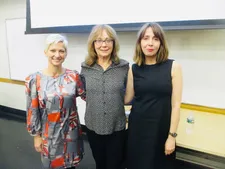 |
| Hunter College German Department Chair Lisa Anderson welcomes Maria Tatar with Anne-Katrin Titze Photo: Tammy Bender, courtesy of Anne-Katrin Titze |
In 2018, I introduced Maria Tatar’s Max Kade lecture Therapeutic, Toxic, and Skin Deep: The Dark Magic of the Grimms’ Fairy Tales, presented by the German Department of Hunter College. She is the John L Loeb Research Professor at Harvard University and a senior fellow at Harvard’s Society of Fellows. Her books include The Annotated Brothers Grimm, The Annotated Classic Fairy Tales, Enchanted Hunters: The Power of Stories in Childhood, and in 2017 The Annotated African American Folktales, co-edited with Henry Louis Gates, Jr., plus many more works as author, editor and translator.
George Lucas gave full credit to Joseph Campbell for the original Star Wars trilogy, stating that if it weren’t for Campbell, “it’s possible I would still be trying to write ’Star Wars’ today.” The model of the journey of the hero as described by Campbell in 1949 influences the way movies are made to this day with calls to adventure, refusals, thresholds to be crossed and inmost caves to be entered to bring back home the elixir that will save the world. What about those who stayed at home, asks The Heroine With 1,001 Faces? What elixirs does she brew and which wrongs does she right? What treasures do these detectives, writers, weavers, and tricksters have in store for us?
From Boston, Maria Tatar joined me on Zoom for an in-depth conversation on The Heroine With 1,001 Faces.
Anne-Katrin Titze: Maria, good to see you!
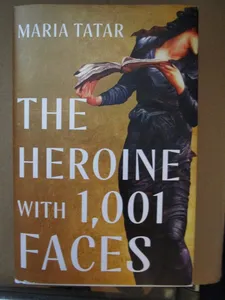 |
| Maria Tatar’s The Heroine With 1,001 Faces (Liveright Publishing, an imprint of W. W. Norton & Company) Photo: Anne-Katrin Titze |
Maria Tatar: Good to see you!
AKT: How are you?
MT: Well, managing. This pandemic business is harder in the winter, I think.
AKT: Let’s talk about your treasure trove of a book! Tackling Joseph Campbell - there is probably no man who influenced Hollywood screenwriting more than Joseph Campbell for the second half of the 20th century at least. Tackling him during the pandemic, was there a call to adventure for you? You mention a moment reading an interview with Natalie Portman [in connection to #MeToo], but was there a specific call for you to engage with him and the Hero’s Journey?
MT: I think your question is a great one because during the pandemic I realised that the possibilities for heroic action had been shut down, particularly in those early months. We were isolated and were told that the best thing to do was to stay home and do nothing. In other words, we couldn’t take those journeys, we couldn’t be adventurers.
And it was then when I realised that women had been confined to the domestic space for centuries and yet they have been heroic. They have been adventurous, curious, and they have made a difference in the world. So I started investigating the weapons that women took even when they couldn’t make the journey and how they managed to move toward justice, to make a move toward social justice.
AKT: Often starting with curiosity. You point out the links between storytelling and textile production. The work of weaving and spinning tales as well as fabric at home.
 |
| The Hunter College German Department Max Kade Lecture in 2018 by Maria Tatar - Therapeutic, Toxic, and Skin Deep: The Dark Magic of the Grimms’ Fairy Tales, introduced by Anne-Katrin Titze |
MT: Yes, women have always been engaged in domestic craft. I use the term craft quite deliberately, that is in both senses of the term. They were doing handicraft; they were spinning; they were sewing. But they were also being clever and they were encoding their work with symbolic value. They were also telling stories while they were knitting, spinning, weaving, embroidering. Using words, often a kind of code language to basically broadcast injuries that had been inflicted not just on them but on their neighbours, their friends, their relatives and to talk about the violence in the world and how to repair it and how to mend the fraying edges of the social fabric. As Scheherazade does.
AKT: Of course!
MT: Within a matter of days, of course, I thought about Scheherazade’s work and how, first of all she volunteers. She is courageous. She volunteers to marry Shahryar.
AKT: So many heroines in fairy tales do. Take Beauty and the Beast where the daughter volunteers to take the place of her captured father. They don’t shy away, these heroines.
MT: That’s a great point. If you think about women’s labour and how it has not been compensated in any way or recognised. We have the story of Scheherazade, the frame story to the Arabian Nights, where Scheherazade volunteers like Katniss Everdeen in The Hunger Games. She takes a great risk in marrying Shahryar because he has been beheading every woman he marries the morning after. So what does she do? She tells stories. She tells him stories, she stops halfway through and arouses Shahryar’s curiosity so that he lets her survive for another day. Time goes by and eventually he marries Scheherazade, they have children together. And he also changes his violent ways.
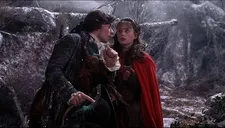 |
| The Wolf (Micha Bergese) with Rosaleen (Sarah Patterson) in Neil Jordan’s film adaptation with Angela Carter of her story The Company Of Wolves |
AKT: And she stops the killings, as do all the heroines in the different Bluebeard tales, who through their curiosity expose the past violence. I like very much the title you chose for your book. Of course The Hero with a Thousand Faces is Campbell’s title. Besides the 1,001 Nights reference, the 1 in the end also points to the individual. There was a great documentary [entirely edited from archival footage] at Cannes last year, called Babi Yar. Context [directed by Sergei Loznitsa], about the massacre of that name, where 33,771 Jews were killed by the Nazis within two days in 1941 in Kyiv. The fact that we have that exact number makes it impossible to think of it in the abstract. The 1 in the end points to the individual and that’s what your title also does.
MT: Oh that’s beautiful, because 1,001 in Arabic can also mean an infinite number, that is you can go on and on. But as you point out, that 1 brings in the singularity, it brings in Scheherazade. She is the one, the chosen one in a sense, who is going to end this reign of terror. So thank you for that because I hadn’t thought about how 1,001 captures not just an infinite number of possibilities but also the singularity, the magnificence of the heroine.
AKT: Another thought that came to my mind when you bring up Penelope and the ducks, besides the name of course, was the duck in Hansel and Gretel, who bonds with Gretel in a way to return the children home. Is there a connection?
 |
| The Annotated African American Folktales, co-edited by Henry Louis Gates, Jr. and Maria Tatar (Liveright Publishing, an imprint of WW Norton & Company) Photo: Anne-Katrin Titze |
MT: I hadn’t thought of that. Who knows? I think the Grimms were constantly dipping into the great cauldron of story and they were so erudite and learned that it wouldn’t surprise me if they just decided to have a duck help Hansel and Gretel cross the pond. And that they understood that that duck has a kind of mythical resonance. They themselves also believed in the great cauldron of story, that is that myths and fairy tales were part of one great - how can I put it? Stew sounds a little vulgar.
AKT: It’s not Juniper Tree.
MT: A beautiful mix, a tasty savory stew of stories. You come across all of these analogies and parallels within very different traditions. This is something Campbell was onto and why I grew to admire him, even though I was building a kind of critique of his work as well. Because he was one of the first really to think globally, to think in global terms about storytelling.
AKT: I agree with you that Disney’s Beauty And The Beast from 1991 did not have a good enough look at Angela Carter’s work. Every time I come across the expression ‘old wives’ tales’, I hear the voice of the wolf [dressed as a fine gentleman] in Neil Jordan’s film of The Company Of Wolves. Carter was making the point that calling the tales such makes them easy to discard and dismiss.
MT: Absolutely. And if you think about it, all those stories that we just talked about that were narrated in spinning rooms, in sewing circles, in places where women congregated, turned into nursery and household tales, as the Grimm’s called them. And then, worse yet, into fairy tales, which makes them even easier to dismiss. All of those terms make it feel as if these are kind of silly stories. And then along comes Disney and says of course these are really for children and they are not adult fare at all.
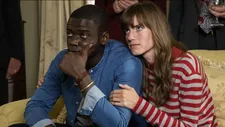 |
| Chris (Daniel Kaluuya) with Rose (Allison Williams) in Jordan Peele’s Get Out (Best Original Screenplay Oscar winner) |
And yet, look at Beauty and the Beast, which you just mentioned, of course we have the Angela Carter version, the Disney version but the Disney version is morphing into new versions of itself and then wonder of wonders, Shrek appears in the landscape. And there’s a story in which we discovered that maybe it’s not so bad being a beast after all. The fields connecting nature and culture have been reversed. Again, not necessarily an aggressive move, but a discovery that there’s something in nature that we can learn and benefit from and that civilisation has not just its discontents, but also violent features as well.
AKT: You mention Christopher Vogler’s book in the context of Joseph Campbell. I remember working with my then boyfriend, the screenwriter Michael Schulz, on developing a number of fairy tale film projects. He had already years earlier written the script for Karin Brandauer’s Cinderella film. She was the wife of actor Klaus Maria Brandauer, who was Mephisto and in Out Of Africa. Anyway, Michael had done fairy-tale films before and the structure felt almost a bit suffocating to work with. Did you come across Vogler now or were you aware of his manual prior to writing this book?
MT: I was aware of the book, but I hadn’t read it yet. What you say is really interesting, because you can think of the twelve steps that he constructs as a kind of cage for writers. There’s some that would stick by the rules and rather than improvise and do reversals, you know, that’s when the story becomes interesting, when you add something to it, when you change it, when you create a situation in which there’s a thirteenth step. Or ten is somehow part of an uncanny moment.
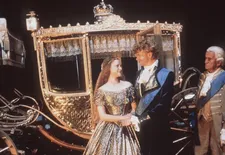 |
| Aschenputtel (Petra Vigna) with the Prince (Stephan Meyer-Kohlhoff) in Karin Brandauer’s Cinderella film, screenplay by Michael Schulz |
The writer Neil Gaiman, I think I mention it in the book, when he started reading Campbell’s Hero with A Thousand Faces, he stopped after reading 20 pages or so. Because he thought 'I don’t want to really become conscious of these types of things.' He thought it was maybe in his head subliminally but it would interfere with his creativity if he became aware of those kinds of rules. I think he was on to something, that somehow the minute you are rule-bound, you shut down the possibilities for creative improvisations.
AKT: Which also connects to the Audre Lorde quote [“The master’s tools will never dismantle the master’s house”]. How can you dismantle something to create your own when you use the same blueprint? I like very much that you never give us twelve stages of the heroine’s journey in your book.
MT: Some people find that annoying. They want twelve steps or eighteen steps or something like that. I think somehow for me it became more important to identify the features of heroism. What is it that makes a hero or a heroine? What do they do? What kinds of actions do they engage in, and leading to the whole question of how do we emulate them? I’m not trying to write an inspirational book, but I’m trying to show how heroism changes over time and how we embrace different sets of virtues. And how different opportunities open up over time.
AKT: The oral tradition still plays a part. You bring up in this context someone I just a few days ago e-mailed with about André Leon Talley, your good friend and colleague Henry Louis Gates and what he calls the Talking Book.
 |
| Christopher Vogler’s The Writer's Journey: Mythic Structure For Storytellers & Screenwriters (Michael Wiese Productions) Photo: Anne-Katrin Titze |
MT: Oh yes. It’s extraordinary, every time I pick up a novel by an African American writer I am astonished by the fact that again we have the Talking Book. There is this return to the vernacular and to the autobiographical as a window into experience. It’s sort of retrieving that oral tradition and yet changing it dramatically, making it new in powerful ways.
AKT: And his wonderful program, Finding Your Roots, which is also part of this way of storytelling.
MT: Absolutely. Listening to the voice of the ancestor is what Toni Morrison said again and again. Last night I was reading one of Barbara Neely’s detective novels. She has a heroine detective called Blanche White. I love that, an African American woman named Blanche White. And how does Blanche start every day? She summons her ancestors and asks them for wisdom. In a very colloquial, not in a worshipful religious way. Just, you know, this need to get in touch with your past, with your roots and there’s something about that that is so beautiful. Thinking about generational flows, it connects with stories like Little Red Riding Hood, which gives us daughter, mother, grandmother and gives us a story that shows the connection among generations.
AKT: Have you read The Morningstar, Karl Ove Knausgaard’s latest?
MT: I have not. I barely made it through My Struggle. But I’m totally fascinated by him and the focus on the everyday, the quotidian. Talk about autobiographical and the return sort of to the oral tradition! It’s almost hard to believe that it was written by a man in many ways because of that focus on the domestic. But tell me about The Morningstar!
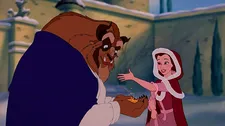 |
| Beast (voiced by Robby Benson) with Belle (voiced by Paige O'Hara) in Disney’s Beauty And The Beast, directed by Gary Trousdale and Kirk Wise |
AKT: He is actually going in the direction of myth, science fiction, thriller, the biblical references to the Morningstar, and connecting these elements to the quotidian, told from different perspectives who all sound a bit like his own voice. A new star appears, strange things happen. He is going into the fantasy realm, which I found fascinating. I liked it very much.
MT: The latest Stephen King novel is called Fairy Tale, which is also a portal fantasy. This strange new world. I think our current obsession with dystopias of course is driven by the pandemic and also the speed of technological change, the warped speed of cultural change right now. It’s an interesting time in good ways and bad.
AKT: If you have new heroines, you’ll also get new shadows.
MT: Right, absolutely. You get something like Get Out, where the woman becomes the Bluebeard figure.
AKT: Right!
MT: Interesting reversals, new forms of villainy. Then also we’re reinventing the female heroine. Many of them, as we see when we start to stream or go to the movies, tote guns, are gun-toting heroines, shooting them up, leaping over tall buildings. They engage in all forms of combat.
AKT: And with that they are going from one extreme to the other - from sleeping in a coffin to shooting 'monsters' left and right.
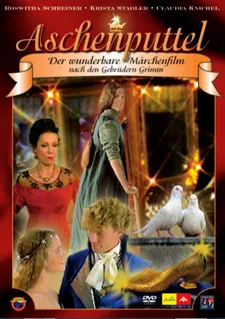 |
| Aschenputtel poster |
MT: Right, basically mimicking male behaviours and what we worshipped in the past. It’s a concerning tendency I think. Do we want the musclebound heroine or do we want the heroine who survives by using her wits and her cleverness, her social skills?
AKT: Good question. One last recommendation from me. Yesterday, I watched a new Danish film called A Taste Of Hunger, It’s about a couple who have a restaurant and he wants nothing more than a Michelin star. There is a 12-year-old girl, who is their daughter, and her behaviour and the storyline for the two kids is something that I think you will enjoy from the tale-telling perspective. Thank you, Maria, so much!
MT: Wonderful to talk and thank you for all the recommendations! I’ve got a lot to look at and read in the next few days [earlier, I brought up to Maria Paul Thomas Anderson’s Phantom Thread and Jane Campion’s soon to be Oscar-nominated The Power Of The Dog].
AKT: I do too from all the connections in your book that are like street signs leading the way to wondrous journeys.
MT: Great to talk to you, take care!
Coming up - Maria Tatar on Alex Garland’s Ex Machina and male anxiety, the meaning of clothing in All Fur, Donkey Skin and an Egyptian variant of the tales, boys in search of fear and girls in haunted houses, eating disorders and the appetite of tricksters in The Hunger Games and David Fincher’s The Girl With The Dragon Tattoo, Louisa May Alcott and Little Women paving the way for Anne Of Green Gables and A Tree Grows In Brooklyn, Astrid Lindgren’s Pippi Longstocking and the home front, plus Maria’s and my favourite childhood fairy tales.
























